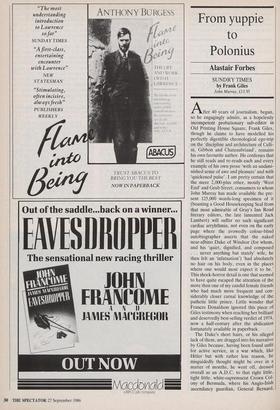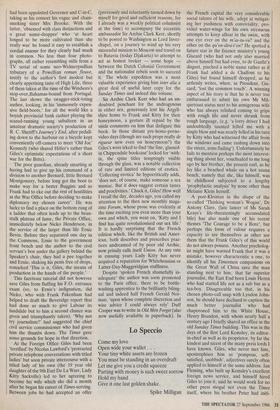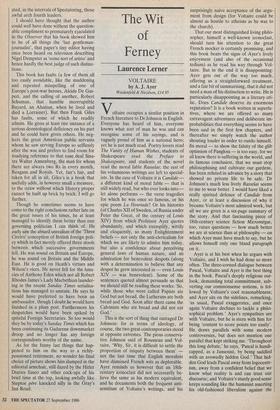From yuppie to Polonius
Alastair Forbes
SUNDRY TIMES by Frank Giles
John Murray, f13.95
After 40 years of journalism, begun, so he engagingly admits, as a hopelessly incompetent probationary sub-editor in Old Printing House Square, Frank Giles, though he claims to have modelled his perfectly digestible chronological ego-trip on the 'discipline and architecture of Celli- ni, Gibbon and Chateaubriand', remains his own favourite author. He confesses that he still reads and re-reads each and every example of his own prose 'with an undimi- nished sense of awe and pleasure' and with `quickened pulse'. I am pretty certain that the mere 2,000-plus other, mostly 'West End' and Grub Street, consumers to whom John Murray has made available the pre- sent 125,000 words-long specimen of it (boasting a Good Housekeeping Seal from that most admirable of Gray's Inn Road literary editors, the late lamented Jack Lambert) will suffer no such significant cardiac arryhthmia, not even on the early page where the avowedly colour-blind autobiographer asserts that the naked near-albino Duke of Windsor (for whom, and his 'quiet, dignified, and composed . . . never anything but stately' wife, he then felt an 'infatuation') 'had absolutely no hair on his body, even in the places where one would most expect it to be.' This shock-horror detail is one that seemed to have quite escaped the attention of the more than one of my candid female friends who had much more frequent and con- siderably closer carnal knowledge of the pathetic little prince. Little wonder that Frances Donaldson ignored this piece of Giles testimony when reaching her brilliant and deservedly best-selling verdict of 1974, now a half-century after the abdication fortunately available in paperback.
The Duke's short hairs, or his alleged lack of them, are dragged into his narrative by Giles because, having been found unfit for active service, in a war which, like Hitler but with rather less reason, he misguidedly thought might be over in a matter of months, he went off, dressed overall as an A.D.C. to that right little, tight little, white-supremacist Crown Col- ony of Bermuda, where his Anglo-Irish ascendancy guardian, General Bernard, had been appointed Governor and C-in-C, taking as his consort his vague and chain- smoking sister Mrs Brooke. With the latter, 'obsessed with class distinctions and a great name-dropper' who 'at heart longed to be more cultivated than she really was' he found it easy to establish a cordial entente for they clearly had much in common. No less than four photo- graphs, all rather resembling stills from a TV serial of some neo-Widmerpudlian tributary of a Powellian roman fleuve, testify to the author's first modest but clearly appetising taste of High Life, three of them taken at the time of the Windsors's stop-over,Bahamas-bound from Portugal. The last shows the swagger-stick-toting author, looking, in his 'immensely expen- sive field-boots,' for all the world like a boyish provincial bank cashier playing the scared-running young subaltern in an amateur dramatic society's production of R. C. Sheriff's Journey's End, after pedall- ing down to the harbour on a bicycle kept conveniently off-camera to meet 'Old Joe' Kennedy (who shared Hitler's rather than Giles's optimistic expectations of a short war for the Brits).
The poor guardian, already smarting at having had to give up his command of a division to another Bernard, little Bernard Montgomery, before long got the boot to make way for a better Buggins and so Frank had to eke out the rest of hostilities at the War Office before deciding `to make diplomacy my chosen career'. He was lucky to find a place on the bottom rung of a ladder that often leads up to the bean- stalk plateau of fame, the Private Office, immediately below Nicko Henderson, in the service of the larger than Iife Ernie Bevin. Before they separated one day in the Commons, Ernie to the government front bench and the author to the civil servant's box under the gallery behind the Speaker's chair, they had a pee together and Ernie, shaking his penis free of drops, remarked 'This is it, Giles, the means of production in the hands of the people.'
This facetious tutorial did not however save Giles from fluffing his F.O. entrance exam (so, to Ernie's indignation, did Nicko, who with Frank Pakenham had helped to draft the Beveridge report that had done so much to give Labour its landslide but to him a second chance was given and triumphantly taken). 'Why not try journalism?' had suggested the chief civil service commissioner who had given him the thumbs down. The Times gave some grounds for hope in that direction.
At the Foreign Office Giles had been `terrified' by Nicolas Lawford's `protracted private telephone conversations with titled ladies' but soon private intercourse with a titled lady of his own (the 19 year old daughter of the 9th Earl De La Warr, Lady Kitty Sackville) led to her agreeing to become his wife which she did a month after he began his career of Times-serving. Between jobs he had accepted an offer (previously and reluctantly turned down by myself for good and sufficient reasons, for I already was a weekly political columnist at the time) to accompany the eccentric ambassador Sir Archie Clark Kerr, shortly to be posted to Washington as Lord Inver- chapel, on a journey to wind up his very successful mission to Moscow and travel on to Batavia (today Djakarta) to attempt to. act as honest broker — some hope between the Dutch Colonial Government and the nationalist rebels soon to succeed it. The whole expedition was a most valuable experience giving him inter alia a great deal of useful later copy for the Sunday Times and indeed this volume.
Sir Archie Clark Kerr who had an un- doubted penchant for the androgynous in either sex, generously lent his Argyll- shire home to Frank and Kitty for their honeymoon, a gesture ill repaid by the snide comments on him that disfigure this book. In those distant pre-home-porno- video days (though are such props really de rigueur now even on honeymoon?) the Giles's were irked to find 'the fine, glassed- in Chippendale bookcase' locked for `with- in, the spine titles temptingly visible through the glass, was a notable collection of rare and limited editions of erotica.' `Collecting erotica' he hypocritically adds, `does not, of course, make someone a sex maniac. But it does suggest certain tastes and proclivities.' Chuck it, Giles! How well I recall the day, decades ago, you called my attention to the then new monthly maga- zine Forum, whose prose was evidently at the time exciting you even more than your own and which, you went on, 'Kitty and I find has quite revolutionised our sex life.' It is hardly surprising that the French edition which, like the British and Amer- ican, both describes and prescribes prac- tices undreamed of by poor old Archie, now prissily calls itself Union. At any rate in ensuing years Lady Kitty has never acquired a reputation for Whitehousian or Latter-Day-Muggeridgian stuffiness.
Despite `spoken French shamefully in- adequate' the author was soon promoted to the Paris office, there to be bottle- washing apprentice to the brilliantly biling- ual and indeed half French Gerald Nor- man, 'upon whose complete discretion and wise advice I could always rely' Duff Cooper was to write in Old Men Forget (also now usefully available in paperback). In the French capital the very considerable social talents of his wife, adept at mitigat- ing her pushiness with conviviality, pro- vided water-wings for his own strenuous attempts to keep afloat in the swim, with one eye ever on the m'as-tu-vu? and the other on the qu'en-dira-e on? He spotted a future star in the finance ministry's young Giscard (who had not only also married above himself but had even, to de Gaulle's disgust, pinched a noble name rather as if Frank had added a de Chalfont to his Giles) but found himself dropped, as he artlessly writes, when, as President, Gis- card, 'lost the common touch'. A winning aspect of his story is that he is never too embarassed to admit his own Mr Mil- quetoast status next to his armigerous wife who has always relished coming to grips with rough life and never shrunk from rough language, (e.g. 'a lorry driver I had undoubtedly taunted felled me with a single blow and was nearly felled in his turn by Kitty who had witnessed the affair from the windows and came rushing down into the street, arms flailing'). Unfortunately he fails to mention perhaps the most interest- ing thing about her, vouchsafed to me long ago by her brother, the present earl, as he lay like a beached whale on a hot sauna bench, namely that she, like himself, was in childhood subjected to a lengthy `prophylactic analysis' by none other than Melanie Klein herself.
A post-Kleinian in the shape of the so-called 'Thinking woman's Wogan', Dr Antony Clare, (late lancer of Ms Sarah Keays's life-threateningly accumulated bile) has also made one of his recent themes `The Courage to be a Bore', but perhaps this form of valour requires a capacity to see themselves as other see them that the Frank Giles's of this world do not always possess. Another psycholog- ist might have warned Frank that it was a mistake, however characteristic a one, to identify all his Timesmen companions on the Great Wall of China save the man standing next to him, that far superior journalist, the East End born Louis Heren who had started life not as a sub but as a tea-boy. Disagreeable too that, in his chosen photo-call snap with Lyndon John- son, he should have declined to caption the much better journalist who had chaperoned him to the White House, Henry Brandon, with whom nearly half a century ago I briefly shared an office in the old Sunday Times building. This was in the days of the first Lord Kemsley, its editor- in-chief as well as its proprietor, by far the kindest and nicest of the many press lords I have known. Giles, who never met him, apostrophises him as 'pompous, self- satisfied, snobbish', adjectives surely often applied to himself at the same address. Ian Fleming, who built up Kemsley's excellent foreign news service, and himself hired Giles to join it, said he would work for no other press mogul not even the Times itself, where his brother Peter had initi- ated, in the intervals of Spectatoring, those awful arch fourth leaders.
I should have thought that the author could well have done without the question- able compliment so prematurely ejaculated in the Observer that his book showed him to be of all things the 'last gentleman- journalist', that paper's tiny editor having once been heard on television describing Nigel Dempster as 'some sort of aristo' and hence hardly the best judge of such distinc- tions.
This book has faults (a few of them all too easily avoidable, like the maddening and repeated misspelling of one of Europe's post-war heroes, Alcide De Gas- peri, and the calling of another, Robert Schuman, that humble incorruptible Bayard, an Alsatian, when he lived and died a Lorrainer). But then Frank Giles has faults, some of which he readily admits. He gives at least one instance of a serious deontological deficiency on his part and he could have given others. He neg- lects the great American public servants whom he saw serving Europe so selflessly after the war and prefers to find room for toadying reference to that tone deaf Sina- tra Walter Annenberg, the man for whom there are always two Rs in every month, Reagans and Royals. Yet, fair's fair, and taken for all in all, Giles's is a book that usefully adds, in however small a measure, to the straw without which History proper cannot be built up brick by brick. I will go further.
Though he sometimes seems to have come to the right conclusions rather late on the great issues of his times, he at least managed to identify them better than one governing politician I can think of. He early saw the absurd unrealism of the 'Three Circles' conception of British foreign poli- cy which in fact merely offered three stools between which successive governments fell. He was sound on Britain and Europe, he was sound on Britain and the Middle East. He is good on Heath's virtues and Wilson's vices. He never fell for the luna- cies of Anthony Eden which not all Robert Rhodes James's Lady Macbethian launder- ing in the recent Sunday Times serialisa- tions has managed to unstain. He says he would have preferred to have been an ambassador, though I doubt he would have finished in a plum post. Furthermore his despatches would have been spiked by spiteful Foreign Secretaries. So too would they be by today's Sunday Times which has been continuing its Gadarene downmarket droop and no longer has any foreign correspondents worthy of the name.
As for the funny last things that hap- pened to him on the way to a richly- pensioned retirement, no wonder his final choice of picture shows him slumped in the editorial armchair, still dazed by the Hitler Diaries fiasco and other cock-ups of his brief time at the top, looking awfully like Steptoe pere knocked silly in the Gray's Inn Road.




























































 Previous page
Previous page